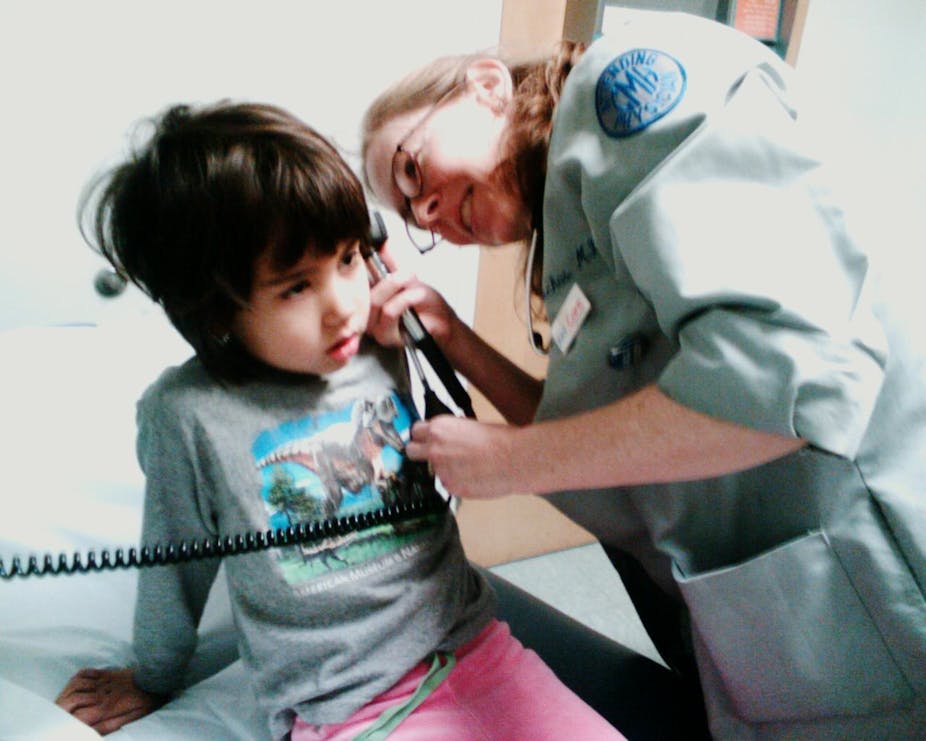Research shows mothers prefer advice from their peers about health-care providers and medication. Such referrals are more trusted than practitioners or the paid marketing messages about health-care products.
Women with children confront a large number of health-care providers and must sort through many alternatives for both themselves and their children.
So they rely on recommendations from family and friends to make difficult or time-consuming choices a little easier, and for confirmation that they’re making the right decisions. Referrals from friends and family are more trusted than the commercial marketing messages from health-care companies.
Research findings
While hospital management practices aim to incorporate quality, customer satisfaction and loyalty in their processes, most mothers we interviewed felt there was still a very big information gap between patient and practitioner.
A referral from a trusted source such as a family member or friend cuts through marketing and provides a more believable or credible indication of quality.
Significantly, when they deferred to professional opinion, the women we interviewed during our research project checked the information received.
So while “doctor-knows-best” passivity may have traditionally defined the health industry, that model apparently no longer applies.
A personal recommendation is perceived as more trustworthy than advertising, and recommendations can be far more powerful than traditional advertising strategies.
Mothers trusted a referral source if the person giving the referral had experienced the service they were recommending, or if they knew someone who had.
The time proximity of the experience was also important – someone who had used a health-care provider within a few years was more trusted than someone who had used one ten years ago.
Credibility was inherent in the referral being unpaid or unrewarded.
The women in our study listened to the advice of professional staff, but where a choice of service was offered, they asked around.
They also spoke to other mothers about their experiences - the good, the bad and the really bad. Excellent service is talked about, but so is bad service.
In fact, they compared notes, stories and experiences; everything that makes referrals valuable in other industries clearly also applies to the health-care industry.
Implications for health-care marketing
First, the women we spoke to do not trust marketing and advertising information or recommendations from health-care service staff.
Health-care marketing should therefore adopt reassurance strategies or work on positive reinforcement of the benefits of the service, rather than focusing on a selling strategy.
Second, training both medical and support staff will help foster positive interactions. Mothers judge the bedside manner of everyone they come into contact with, from the doctor to the receptionist.
For example, none of the mothers in our study mentioned the physical surroundings of the health-care institutions they had been to.
While a minimum level of comfort and child-friendly consideration was expected, it was not a main measure distinguishing health-care organisations from each other. The manner of staff, both professional and administrative, was more important.
Third, health-care marketers should avoid simply adding attributes to existing products in an attempt to increase the value measure of price versus quality. For example, offering packages of combined products.
This approach rarely works as mothers don’t to trust it.
A health-care product is likely to be complex, consisting of components such as the medical knowledge of the health-care professional; bedside manner; prescribed medications; and reception staff.
Adding to these components may confuse or provide cause for concern if the organisation cannot meet, or exceed, expectations.
It is more effective to deliver on the perceived quality and to communicate reassurance and reinforcement – rathar than selling.
Finally, we think the health-care industry needs to develop positive service experiences and form relationships with parents and children.
The industry should move away from its traditional operating practices of putting the needs of physicians and health-care industry stakeholders, such as financial backers and senior management, first.
It should instead drive organisations to focus on appealing to increasingly assertive and knowledgeable patient-customers.
Clients can be demanding and are not necessarily loyal, depending on the anticipated length of their relationship with a service provider. There will be a difference in how they react to a quick emergency service versus a lengthy treatment process.
The mothers in our study were willing to change health-care providers to find one that suited them and their children.
The more competitive the industry becomes, the more choices parents will have.

